Community
It Takes a Community
Published
1 year agoon
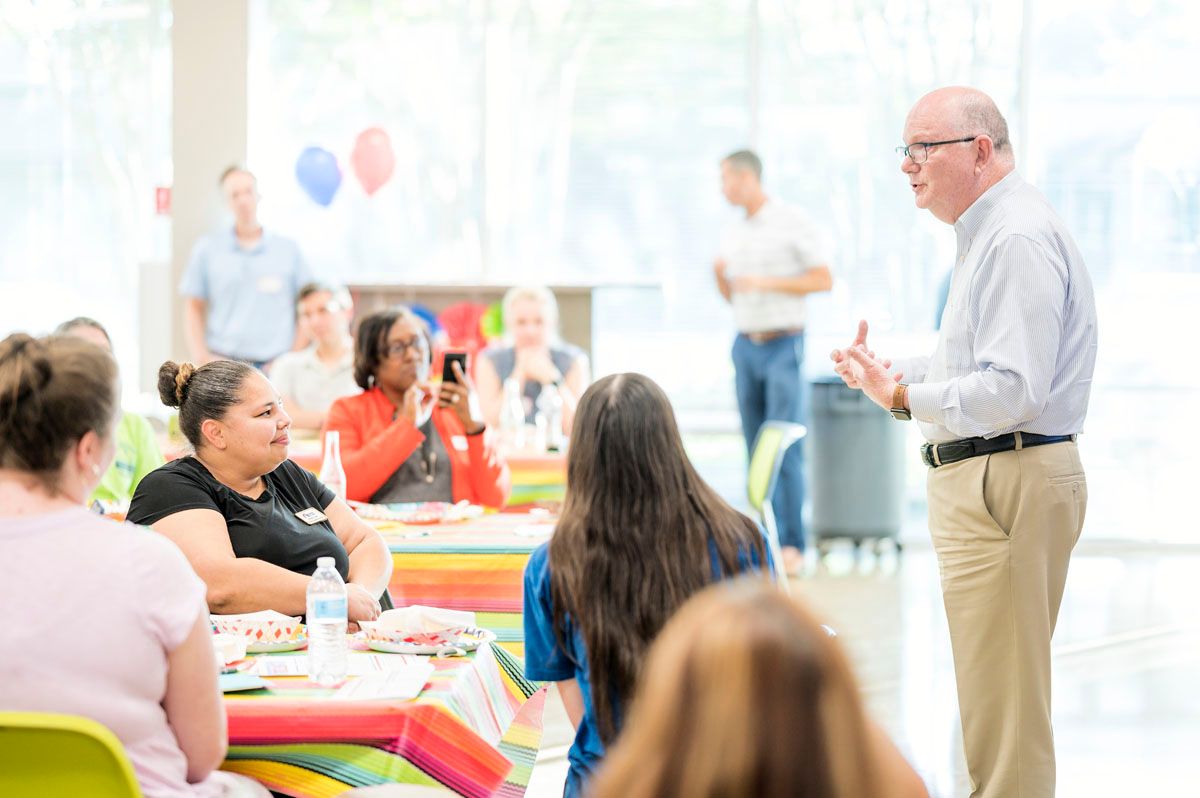
Neighborhood Cooperative Ministries shows how local nonprofits work together to better the lives of at-risk families.
A few years ago, Neighborhood Cooperative Ministries (NCM) acquired a complex to further the mission of helping neighbors who sincerely want to break their cycle of poverty and regain financial independence. To remind the community of its expanded facilities and partnerships with other nonprofits, NCM invited the community to an event called Tacos + Tours.
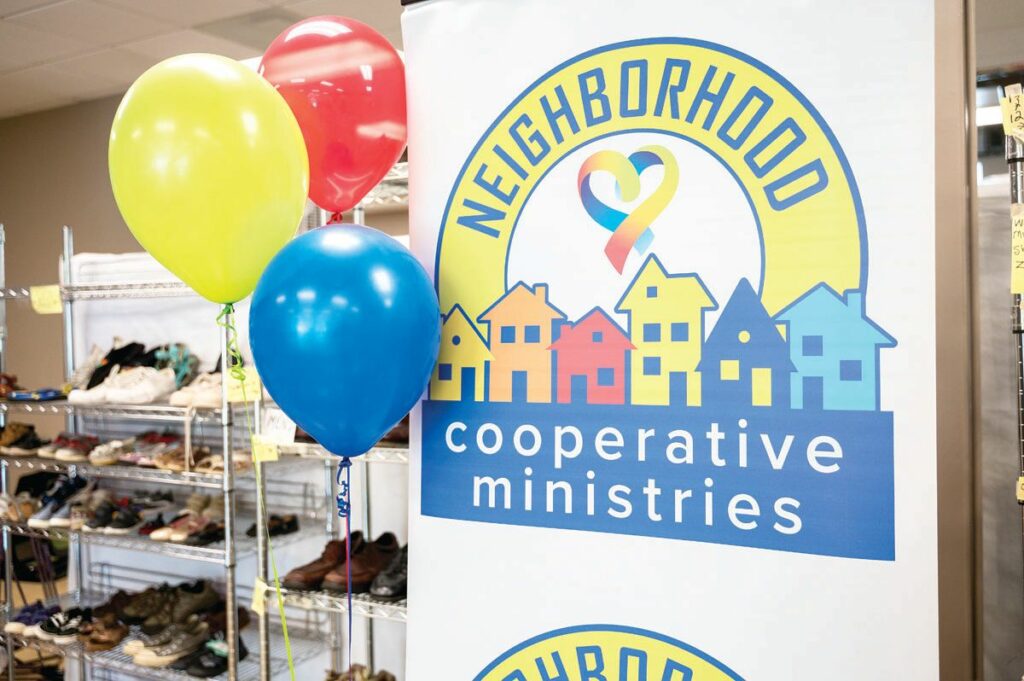
Stakeholders were informed about ways they could continue their support while munching on tantalizing Latin cuisine. Afterwards, guests were shown the improvements and processes NCM has devised to help those in need.
Ryan Jones, director of community development, kicked off things by explaining why he retired from his career in banking to begin the journey of helping improve the lives of people who were hungry, homeless, jobless and lacking some of life’s basic necessities.
“I realized today that it’s my two-year anniversary here,” he said. “The man is in the room who, kind of, led me on the journey to retire as a banker.”
He motioned to Randy Redner, who had been the president of the Community Foundation at the time and now is working at Rainbow Village.
“One of the things that stood out to me as I was doing my discernment and making my career change was ‘where could I make the most impact?’” said Jones.
He shared statistics about the pockets of poverty in the community. Then the various partners talked about how they work together to improve the lives of at-risk families in Gwinnett County.



Community helping community
“We’re now a county of more than a million people. We expect to have another 500,000 in the next 20 years,” said Jones. “The poverty rate has doubled, and the vast majority of that poverty is right here in our surrounding area.”
According to the United Way’s child well-being index, 45% of southwest Gwinnett’s children are living below the poverty line. That adds up to more than 11,000 kids.
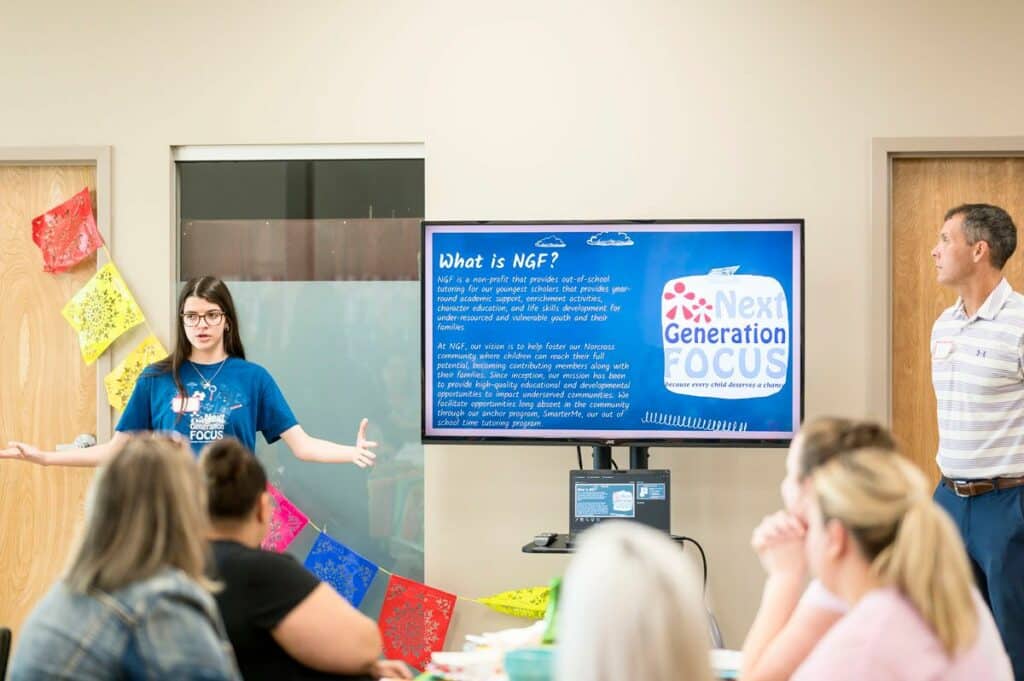
Lack of affordable housing is also a big issue in this area. “A lot of times, we have families that are living in extended stay hotels and paying more money to live there than I pay for my house,” said Jones. “What these families are facing, a lot of times, is a cycle of poverty. They’re forced to make choices between their basic needs. ‘Am I going to feed my kids healthy food or am I going to pay for transportation to get to work? Am I going to pay for my medical bills?’”
Jones added that this cycle of poverty creates low grades in school, high unemployment rates and many other negative effects.
Even though the area boasts some of the toniest homes, high incomes and high levels of education, there are pockets of poverty similar to those near Clarkson, where refugees are given solace, or west of Mercedes Benz Stadium, where homelessness and addiction are high.


Better Work Gwinnett
Luisa Beeco, a program manager for Better Work Gwinnett, part of the Georgia Center for Opportunity, (GCO) explained that GCO focuses on family work and education.
“Our goal is removing barriers, and we do it in many ways so that every person, no matter their race, past mistakes or the circumstances of their birth, can have access to quality education, fulfilling work and a healthy family life,” she said. “We have people who are working on research and policy and working on trying to keep families together.”
One way to keep families together is by making sure the adults have jobs. That’s where the Better Work program comes in.
“It’s not like a staffing agency — it’s different,” she said. “I would call it a referral program.”
Better Work has partnered with multiple employers in the area that have agreed to reach out to job candidates within 3 business days for an interview or a conversation to be able to go through their process.
“We have people go through our portal. It takes five minutes. They can do it on their phone,” said Becco.
Once the applicant signs up, Better Work has a 30- to 60-minute conversation to understand where they fit in the work world. They assess the barriers to work — transportation, childcare, etc. Instead of creating more programs, Better Work connects clients to existing resources such GED classes and English language classes.
Next Generation Focus
Rachel Mannino, a recent UGA grad, is one of the after-school program directors of Next Generation Focus, a nonprofit afterschool program that meets Monday through Thursday, 4:30 to 6:30 p.m. at Norcross First United Methodist Church.
“We also have locations at Discovery High School and Summerour Middle School, and we also meet virtually,” she said. “We provide out of school tutoring for our youngest scholars. That provides year-round academic support, enrichment activities, character education and life skills development for under-resourced and vulnerable youth and their families.”
She explained that since its inception, the mission has been to provide high quality educational and developmental opportunities to impact underserved communities. Students from kindergarten through 12th grade receive assistance in all subjects, including English language classes. There are even English language classes for parents.
Rainbow Village
Rainbow Village is the largest transitional housing nonprofit in Gwinnett County. It was founded by Christ Church in 1991 and used to be a bunch of scattered homes. It is now a 2.5 acre campus in Duluth.
“We can handle 30 homeless families at a time. Those families can stay with us for up to two years. We are not a quick fix program,” said Redner. “This is not a rapid rehousing program, because that just keeps rehousing them again and again. That doesn’t really help families.”
Redner explained that Rainbow Village is working to expanding so it can help more than 30 families at a time. “We have over 2,000 homeless kids in our school system,” he said. “We’ve got a lot of work to do and we’re working hard to expand.”
He said that when he was the CEO of the Community Foundation, he saw that there are six great cooperative ministries across the county that were created 30 years ago by very future thinking leaders.
“When you add all those cooperative ministries together, we see 100,000 people a year; 10% of our population will go through our cooperative ministry,” Redner said.
Rainbow Village sees a 90% success rate in helping families break the cycle of poverty. So, the charities started a pilot program in January where one or two social workers were embedded at other nonprofit organizations.
“We’re working side by side to take a look at that and learn how nonprofits can work closer together,” said Redner.
The NCM tour
Intake at NCM begins in the front lobby where clients are screened to make sure they are eligible for services. “Here they tell a little bit of their story, their background, a little bit of what’s going on,” said Jenny Ortega of NCM.
After being processed, they meet with caseworkers. “Once they come back to us, the options include clothing, food, hotel, rent and utilities,” added Ortega.
The complex also has space for those who just need a little extra help, such as once-a-month food distribution to stretch the grocery budget or clothes for back to school or job interviews, as well as assistance with utilities or finding work.
“We talk to them about all the various different ministries that we have here,” said Ortega. “It’s not just financial; there are also spiritual ministries,” she said.
And there are English classes and healthcare sessions where clients can get blood pressure checks and talk to someone about medical assistance and/or prescriptions assistance.
During COVID, NCM offered a drive-through pantry, but now clients can enter the expanded food facility with more space for cold and frozen foods. Healthy snacks are offered during tutoring sessions.
The changes at NCM are focused on helping families become independent and stand on their own. With the newly formed partnerships, all involved pray that the years ahead see more at-risk families becoming stable and able to give back to the organizations so they can help other families.
By the numbers
11,018 children face hunger in NCM’s service area.
256 individuals were served by NCM in 2022.
336,439 pounds of food was distributed by NCM in 2022.
41 families were served by Rainbow Village in 2022.
274 individuals were connected to jobs and services by Better Work Gwinnett in 2022.
450 to 500 students are served virtually and in person by Next Generation Focus.
28% of Norcross residents spend more than half of their income for rent.
119 billion pounds of food are wasted in the U.S. each year.
Related
Arlinda Smith Broady is part of the Boomerang Generation of Blacks that moved back to the South after their ancestors moved North. With approximately three decades of journalism experience (she doesn't look it), she's worked in tiny, minority-based newsrooms to major metropolitans. At every endeavor she brings professionalism, passion, pluck, and the desire to spread the news to the people.

Community
Peachtree Corners Shines Bright with Light Up the Corners Glow Race this August
Published
3 days agoon
July 24, 2024
Peachtree Corners’ annual Light Up the Corners Twilight Trot and Glow Race is returning to the Forum on Aug. 10 for its 13th year of building community, getting some exercise and benefitting a very worthy cause.
Amy Massey, the founder of Light Up the Corners, said her inspiration for the nonprofit came from serving on the board of the Fowler YMCA for 10 years.
“I was always looking for ways to raise money for [Fowler YMCA’s] annual campaign. And I rotated off about 12 years ago or 13 years ago. At that time, I was looking for ways to raise money, and the City of Peachtree Corners was talking about becoming a city through UPCCA,” she explained.
“I’m a runner and I was a member of the Y, and we had a running group out of the Y. So, I just recruited some of my running friends and decided we would start a race in Peachtree Corners,” Massey added.
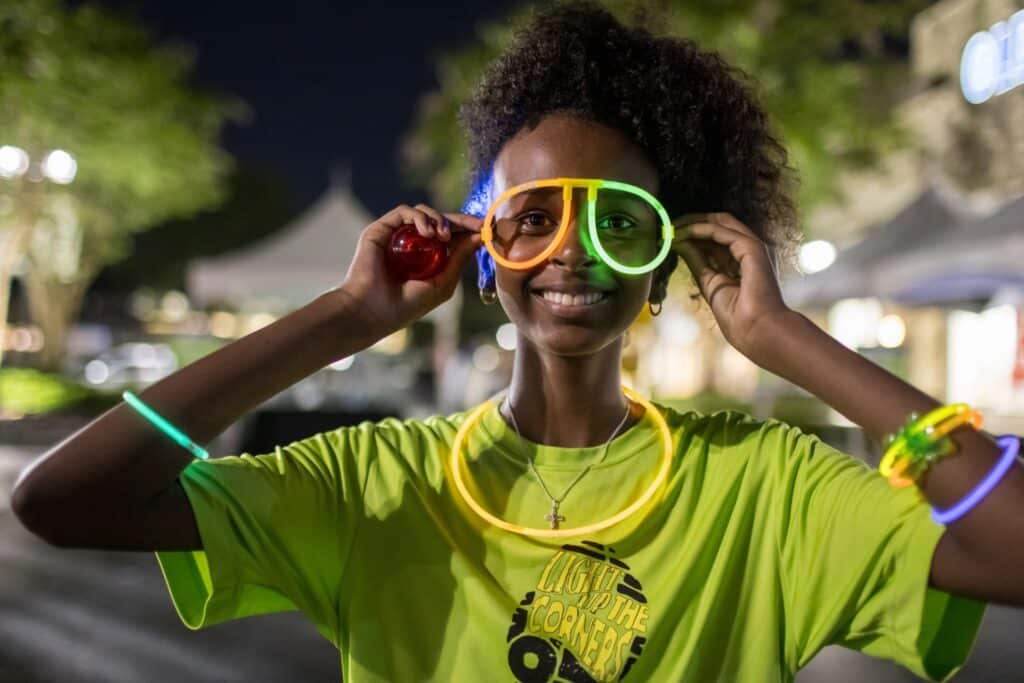
Bigger and better
In its first year, the race had roughly 400 participants. Not a bad turnout for the inaugural event, but Massey and her team of volunteers quickly started brainstorming on how to attract more runners.
“We talked about doing a glow run, and that’s when it changed. So, in year two, we did our first glow run. This year will be our 11th annual glow run and our 12th run altogether. And then we took one year off during COVID,” said Massey.
It’s my baby,” she added. “But I could not do it without the help of my friends and running partners who have been with me all the way. We have some of the same volunteers on our committee now as we did when we started out.”
This year, Light Up the Corners expects over 1,500 attendees.
“There are a lot of glow runs out there that are more of adult-focused parties. But ours truly is a coming together of people of all ages and all walks of life,” said Massey.
“That’s what sets us apart because our largest demographic in terms of age groups is the 10 to 19 range. A lot of school-age kids come out, a lot of young kids with their parents. We have 300 little kids who sign up for the Twilight Trot, which is just half a mile long. And so that attracts the little ones. It’s heartwarming to see people of all ages come together and it’s a healthy fitness-focused, family-friendly community activity,” she added.
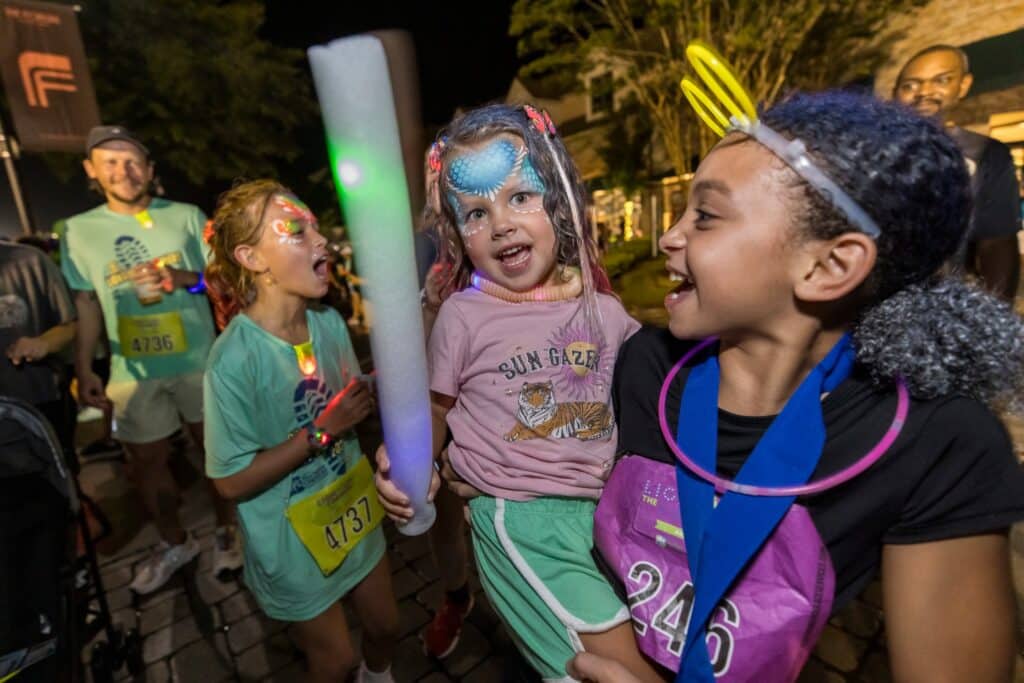
A big, family-friendly party
In addition to two races: a Twilight Trot 1K for the kids, and a 4-mile Glow Race for the adults, the Forum will be showcasing its new plazas. The pre-party and Glow after party will be held on the Grand Plaza which is set to open on that very weekend.
“Each participant gets a lot of glow swag, we want to make sure everybody lights up the course as they’re running around Peachtree Corners, and also to keep them safe so everyone gets that and a glow baton,” explained Massey.
“We welcome runners, walkers and people of all ages. It is more about the fun and the excitement of coming together as a community than it is about racing or setting any speed records,” she added.
The Forum has also hired Yvonne Monet, a radio personality and DJ with Q99.7, to entertain eventgoers and keep the energy up with great music. There will also be face painting and neon fingernail painting, along with roaming entertainers on roller skates and more, courtesy of the Forum.
On top of that, race sponsors will be providing food and samples throughout the night, like pizza, watermelon and a wide variety of other tastings from The Forum restaurants.

Coming together for a worthwhile cause
Light Up the Corners is an IRS-recognized 501(c)(3) nonprofit run entirely by volunteers. There are no paid positions at all, and 100% of proceeds go to the Why it Matters Campaign at the Fowler Y.
“All money stays local, and it is a passion of our committee to help the Y through this campaign. We believe that all people, regardless of their ability to pay, deserve to benefit from the programs and services at the YMCA. And they have a sliding scale that they use to provide financial assistance to people,” said Massey.
“There’s a wide range of programs and services, and I’ve seen firsthand the work that they do there and the life-changing effects that it has had on so many people in our community,” she added.
Sponsors are also fundamental to the event’s success.

Without the support of sponsorships and generous donations, there would likely not even be a race because the associated costs would cancel out the registration fees, explained Massey. Sponsors allow Light Up the Corners to offset all costs of the event so that 100% of registration fees by individuals go directly to the YMCA.
“I will say that North American Properties, when acquired The Forum, have gotten behind this event 110%. They have been amazing in their support and generosity in providing the tents, the entertainment and the backbreaking work of setting up something like this,” said Massey. “We couldn’t do it without them or the City of Peachtree Corners which has been a title sponsor since day one.”
Fun fact: For the first time, Light Up the Corners held an open competition to see who in the community could design the best t-shirt logo for this year’s race. Daniel Lee was chosen out of over 30 submissions and was awarded $1,000 for his efforts.
To participate in the annual Light Up the Corners Glow Run, register at lightupthecorners.com or simply line up on the racecourse and cheer the runners on as a spectator. To become one of over 200 volunteers, email Amy Massey at amassey@runthecorners.com.
Related
Community
Twin Authors Chronicle Antics of ‘Four-Legged Brother’
Published
2 months agoon
June 6, 2024
Berkeley Lake second graders make fans across the globe with sweet children’s story.
When rescue dog Apollo found his forever home with Megan and Mackenzie Grant, the Berkeley Lake twins knew they had added a special member to the family. He’s so beloved that he’s considered their “four-legged brother.”
Apollo is a Boston terrier. The breed is known for its friendliness and love of people and children. According to the Purina Company, makers of all kinds of pet food, Boston terriers make affectionate pets and are outgoing and social.
While they are called ‘terriers,’ they are not in the terrier group, nor do they behave like them. They are far happier at home with their owner than getting into the usual mischief.
But Megan and Mackenzie see him as a silly addition to the family.
“He’s super cool because he’s always up for fun and loves us a whole bunch. And guess what? We love him back even more! He’s like the best friend ever, wagging his tail and making everything awesome!” they said in a press release.
Apollo’s birthday inspiration
As his first birthday approached, the girls, six years old at the time, wanted his day to be special.
“I said, ‘Well if you want to come up with something to do, let’s write it out,’” said mom Tameka Womack. “So they started writing out all these different adventures, and it was so cute.”
Megan recalled that their teacher had told them about someone who had published a book, and she asked if they could, too.
“When I read through it, they had all the different things, like playing dress up because we had bought some clothes for him. And we take them out for long walks around the lake and stuff,” Womack added.
Although their favorite subjects in school are PE and art, they did such a good job with the tale that Tameka worked with them to get it published. On Feb. 1, the young authors released the children’s book, “How We Love Our Four-Legged Brother.”
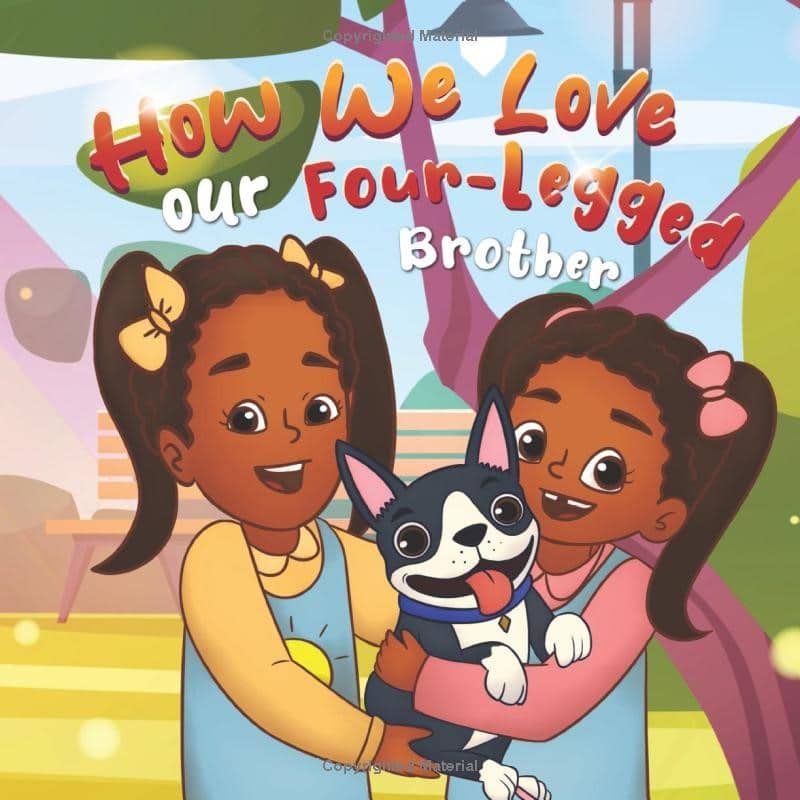
Publishing success
The 30-page book took off almost immediately. Available for print and digital through Amazon and print editions through Barnes & Noble, the book has reached customers in the U.K., Germany, France, Japan, Canada, Australia, Sweden, the Netherlands, Italy, Poland and throughout the U.S.
The girls and their mom were so pleased and surprised to find out the book was No. 1 in its category on Amazon.
“They were just so excited that people actually bought the book,” said Womack. “They were just like, ‘Wow, who is buying this?’”
Feedback from fellow twins, animal lovers and teachers showed that the story resonated on many levels.
“As an educator, I am always on the lookout for diverse and inclusive literature for my students. ‘How We Love Our Four-Legged Brother’ not only captivated the imaginations of the children in my class but also served as a wonderful conversation starter about friendship, empathy and the beauty of diversity,” wrote Ashleigh Darby.
The royalties from book sales are tucked away, with a percentage going to Apollo’s wardrobe.
“He won’t go out in the rain without his raincoat … or out in the winter without his sweater,” said Womack. “We have a little budget for his clothes because every time the girls see something, they’re like, ‘Oh, I think Apollo will like it.’ I’m like, I think he would too, but let’s let it stay in the store.”
Nurturing creativity
Although both mom and dad are engineers and kind of hoped that the twins would follow in their footsteps, Womack said she’s okay with them being artistic and creative.
“Writing is teaching them some responsibility and teaching them a little bit about money,” she said. “Now they want to write a book every day.”
Between raising three daughters (the twins have an older teenage sister), running a household with her husband and keeping up with her career at Georgia Tech, Womack said she’ll look for time to continue helping the girls with their dreams.
“With summer coming up, I would definitely encourage parents to help their children explore their creativity in any kind of way, from digging holes in the ground to … seeing the world … to creating books instead of being on the internet,” said Womack. I try to limit my kids’ screen time … and build real memories.”
Find “How We Love Our Four-Legged Brother” on Amazon.
Related
Community
Local State Reps Give Roundup of Legislative Session
Published
2 months agoon
May 28, 2024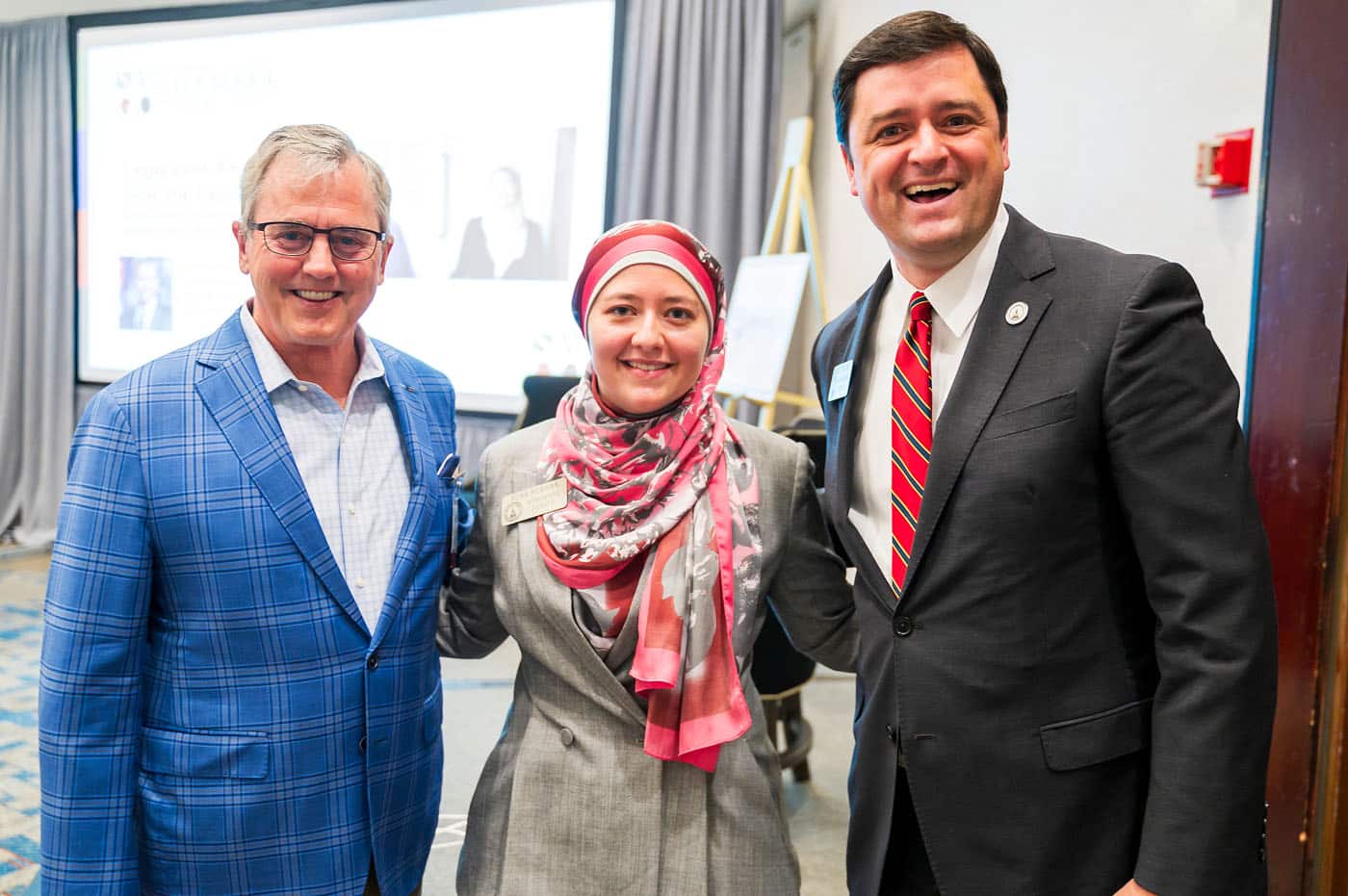
Hilton, Romman trade friendly banter that reflects diverse views in Georgia government
Georgia State House District 97 Representative Ruwa Romman and District 48 Representative Scott Hilton, whose constituents include parts of Southwest Gwinnett County, including Peachtree Corners, sat down for a second time to share information about legislative action at the State Capital.
Their discussion was part of the Southwest Gwinnett Chamber of Commerce First Friday Breakfast series at Atlanta Hilton Northeast.
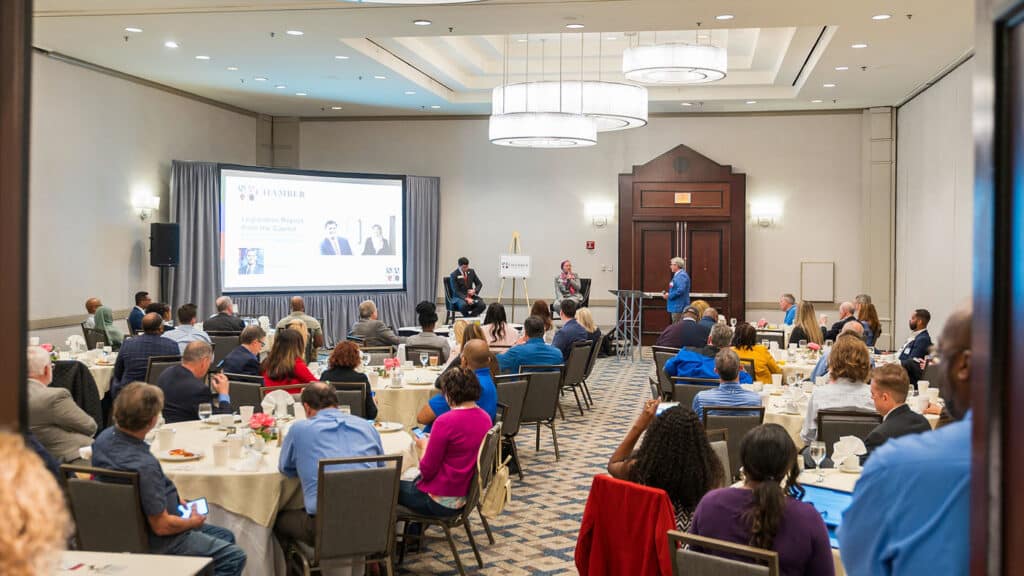
Although they sit on opposite sides of the aisle, Hilton and Romman both seek to sponsor and pass legislation that improves and maintains a high quality of life in the Peach State and provides its residents with what they need.
Elected in 2022, this was Romman’s sophomore year in the State House. She serves on the Georgia House Energy, Utilities and Telecommunications Committee, Georgia House Information and Audits Committee and Georgia House Interstate Cooperation Committee.
Hilton previously served in the State House from 2017 to 2019 but took a “sabbatical,” as he calls it, to serve as executive director for the Georgians First Commission under the Office of Governor Brian Kemp.
He was re-elected to his current position in 2022. He is the vice chair of the Georgia House Creative Arts and Entertainment Committee and the Georgia House Education Committee, as well as a member of the Georgia House Public Health Committee and the Committee on Georgia House Urban Affairs.
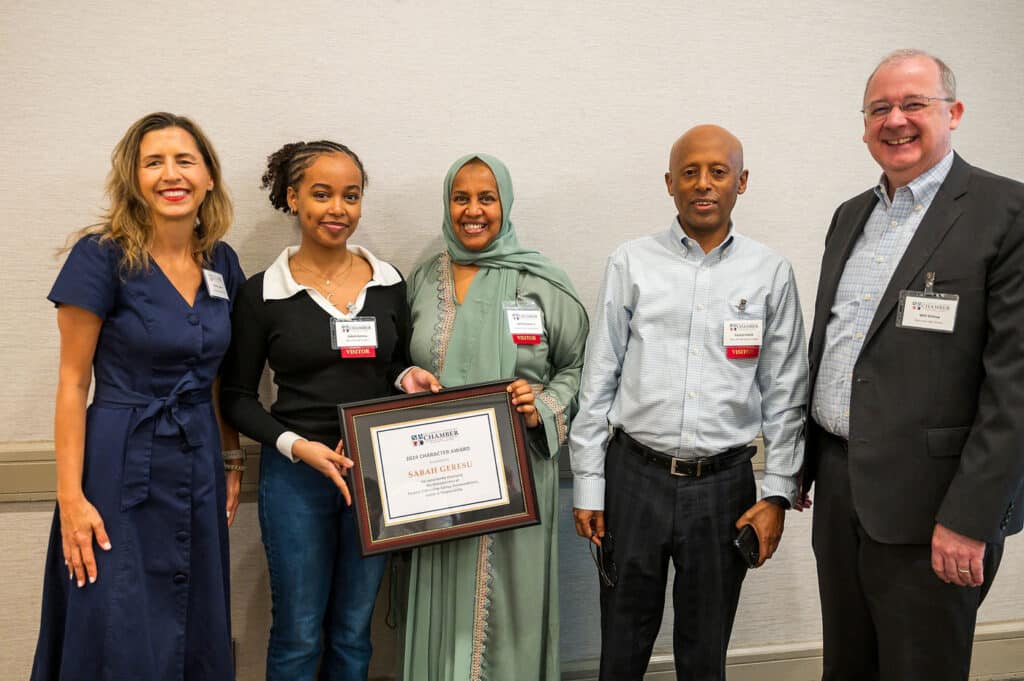
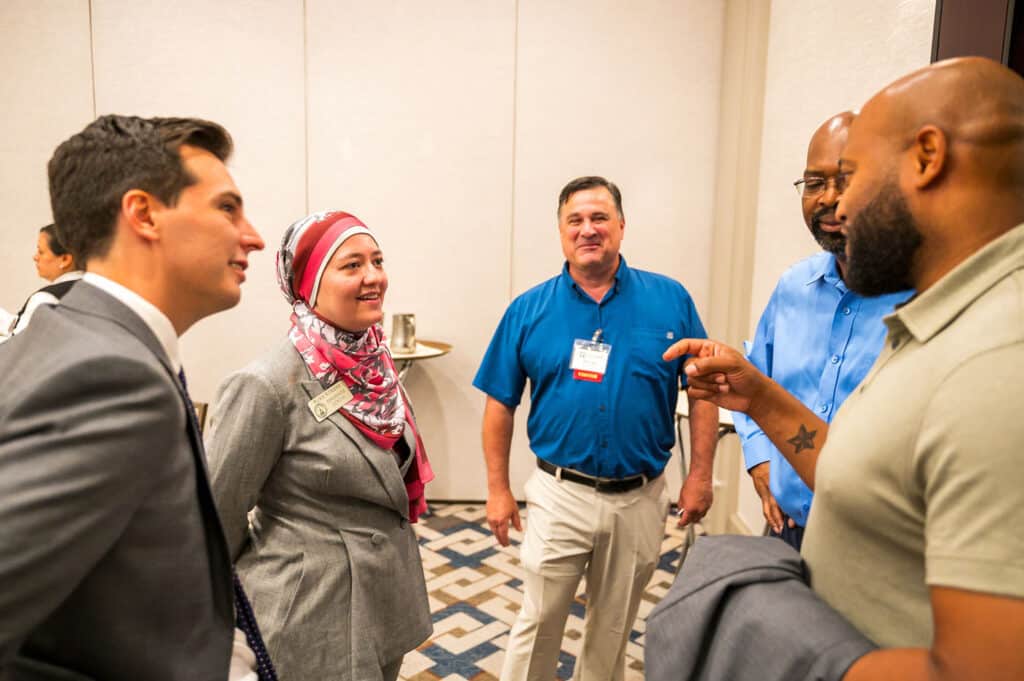
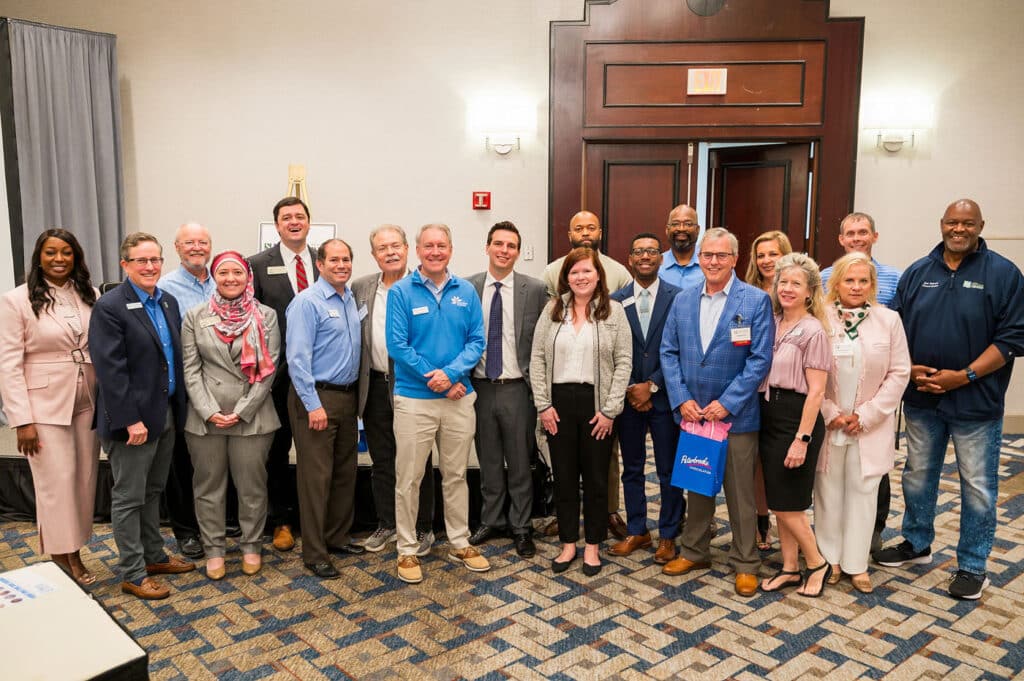
Senate Bill 63
The moderator, Norcross resident and former WAGA political reporter Dale Russell started off with a topic making headlines: Senate Bill 63. This law, signed by Gov. Kemp shortly after the session ended, prohibits charities, individuals or groups from providing bail funds for more than three people per year unless they register as bonding agencies. It also expands mandatory cash bail to 30 new offenses.
“I think it’s going to bring home safety to the community,” said Hilton. “I ran on that issue because as I was knocking on doors, I’ve heard from folks who [want to] keep our community safe. And unfortunately, no community has been immune from the uptick in crime that we had seen post-COVID, so this was one of those bills in response to that.”
Hilton gave examples of crimes where individuals out on bail committed acts such as murder.
“That was our commitment back to our constituents to say, ‘Listen, we’re not going to let bad guys back out onto the streets again to do more crime.’ This bill was in response to this; it’s going to keep our community safe, hold those accountable and bring justice to those who break the law,” Hilton remarked.
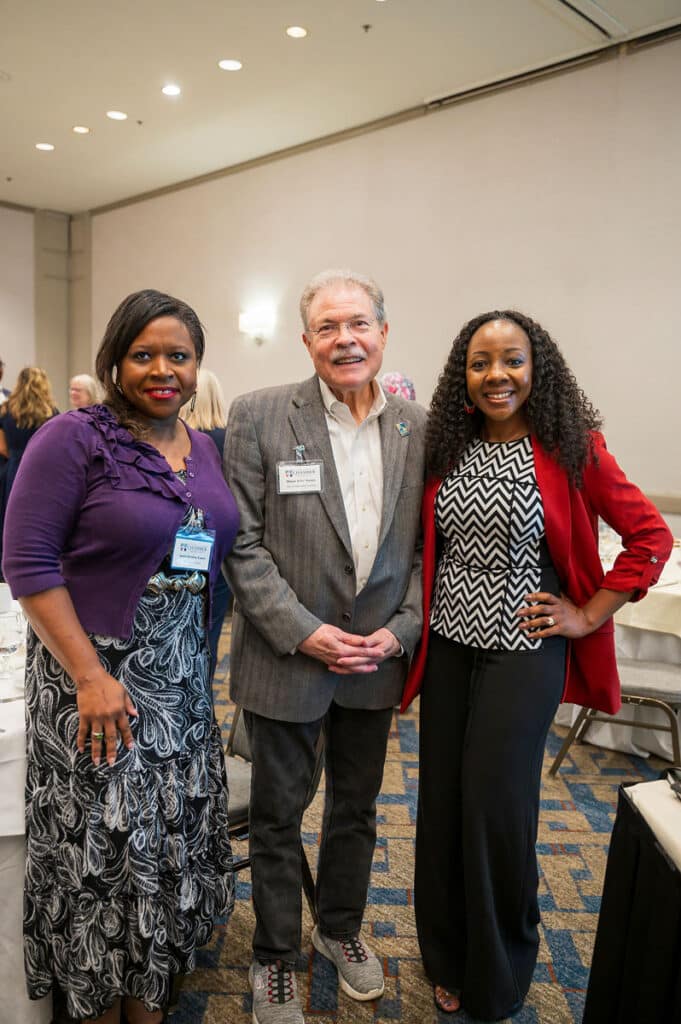
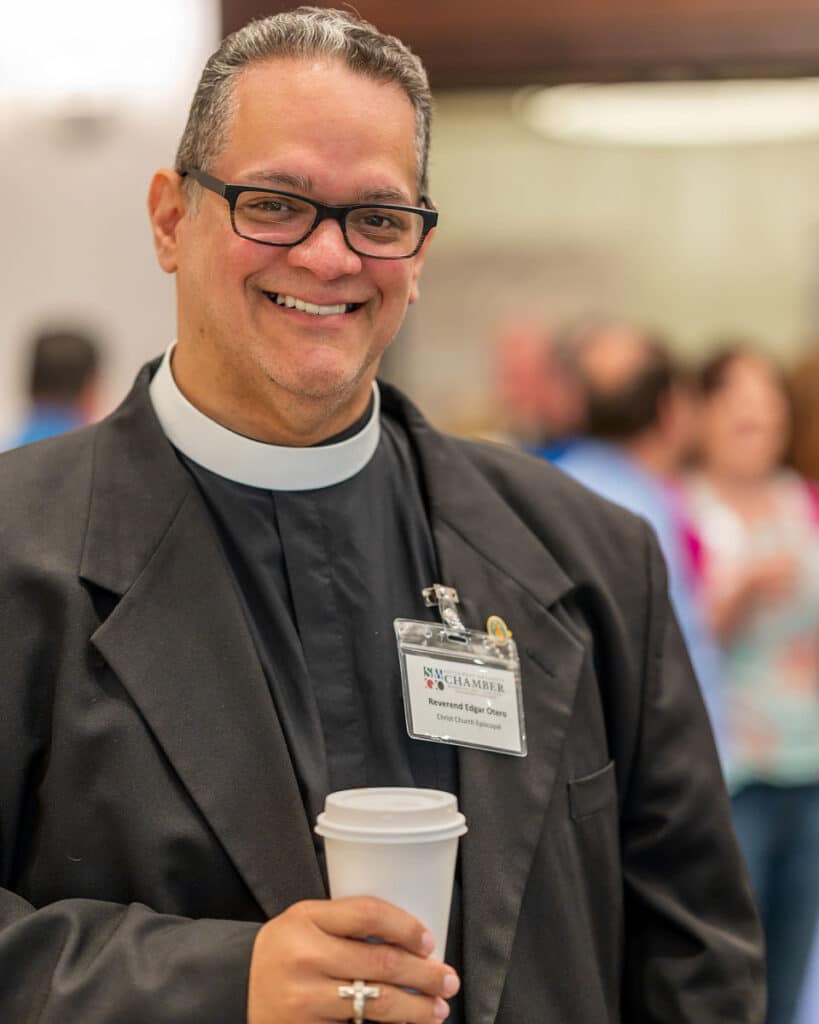
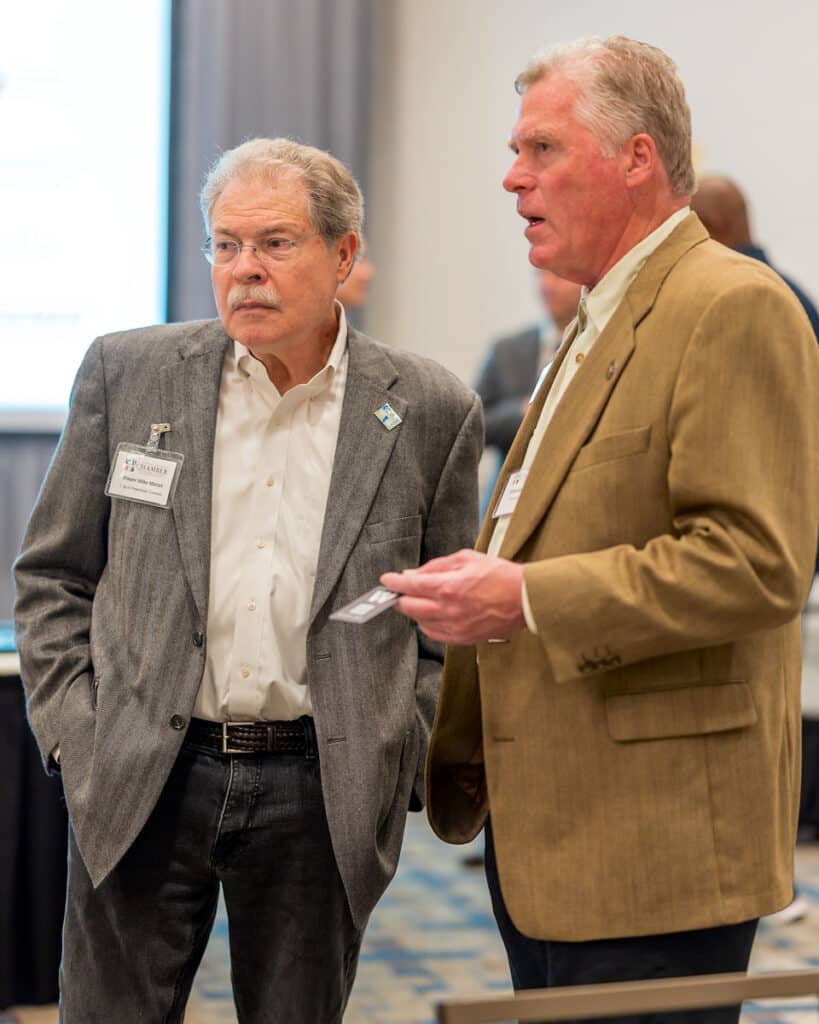
“Unfortunately, right now, we’ve got district attorneys and sheriffs across Georgia who are blatantly disregarding the law and letting folks back out on the streets who pose, you know, safety risks to law-abiding citizens like you and I and your businesses,” he continued.
Russel pointed out that there’s been a lot of criticism of this law.
“The ACLU was totally against it. Some felt like it was imprisoning poor people in the sense, for minor crimes,” he said.
“I do agree with the criticism for a few reasons,” said Romman.
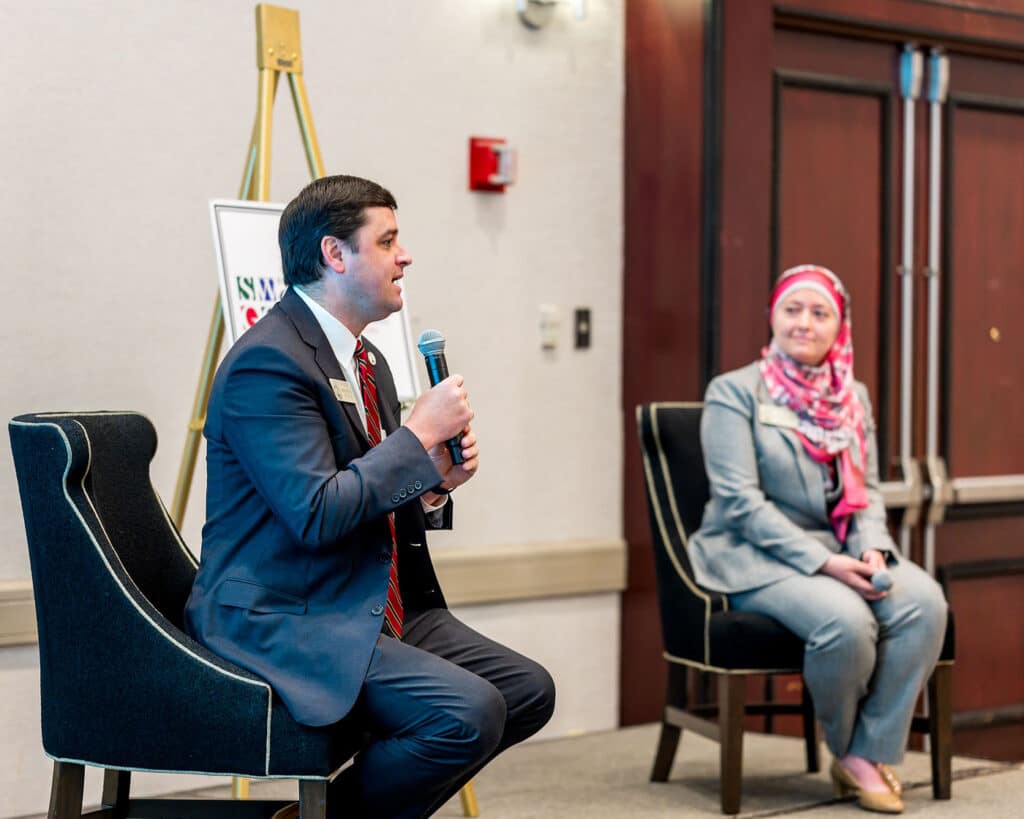
“The problem with this bill is that of the 30 crimes that are listed as now requiring a cash bail, the majority of them don’t actually require jail time, even if you’re found guilty of them. So now, somebody who would not even have ever served time for those crimes that are listed could now serve jail time because they cannot afford their bail,” she explained.
She added that the law doesn’t address the crimes it’s supposed to protect citizens from.
“We see these headlines, but this bill doesn’t address those because what we see happening is that a lot of churches now will no longer be able to bail people out that cannot afford their bail because of this bill,” she said.
“And churches that have been trying to, for example, reunite a parent with their children for Christmas, or whatever the case may be, can no longer do that. There is actually an exception written into this bill for bail bondsmen. So, it’s not like being able to pay cash bail is completely out of the question. It just means that somebody can make money off of it now,” Romman continued.
Hilton said the state isn’t done with addressing public safety issues as they come up.
“I know that’s been a priority of the governor, and I think rightfully so; you know, there’s a reason we’ve got citizens flocking to Georgia over the last ten years; we’ve added a million Georgians to our state, and they are leaving states with policies that don’t have this. They’re coming to Georgia for economic prosperity, for safety and for good schools,” said Hilton.
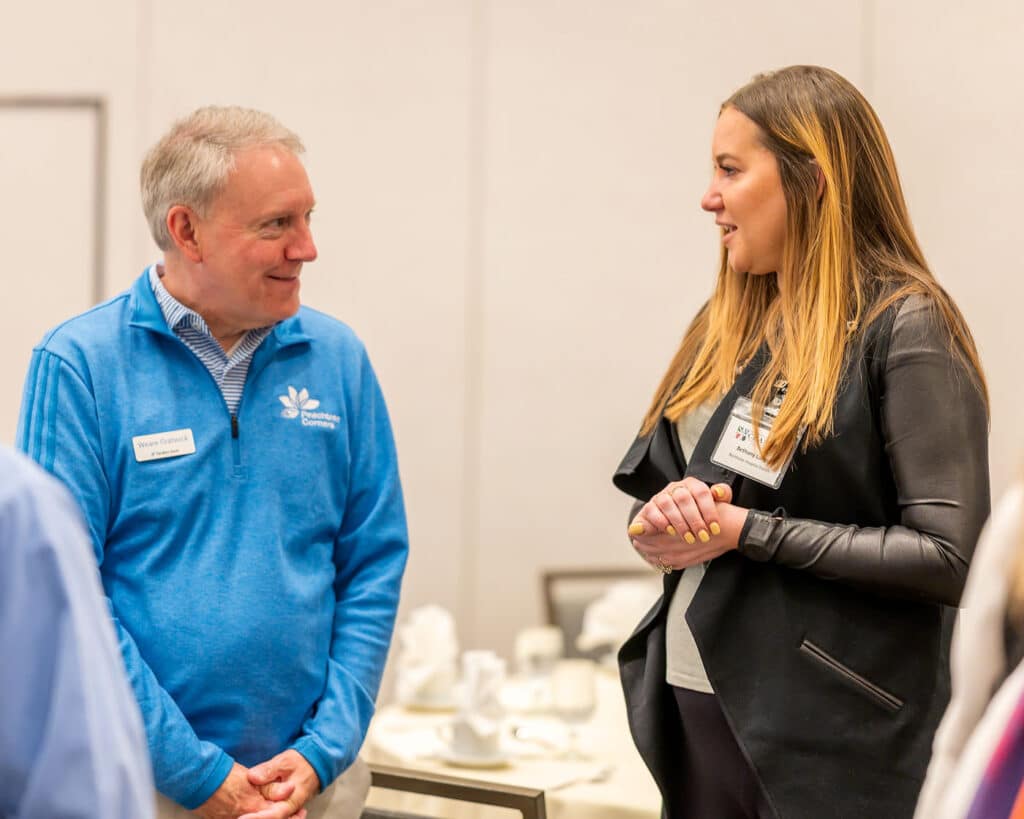
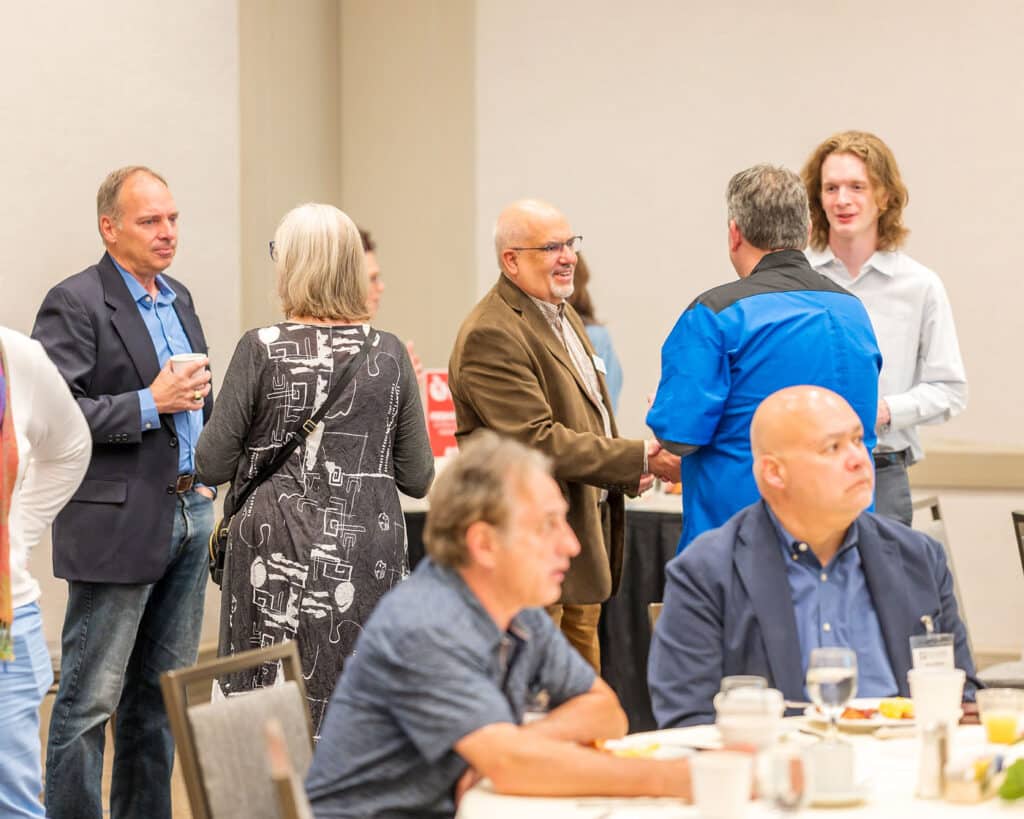
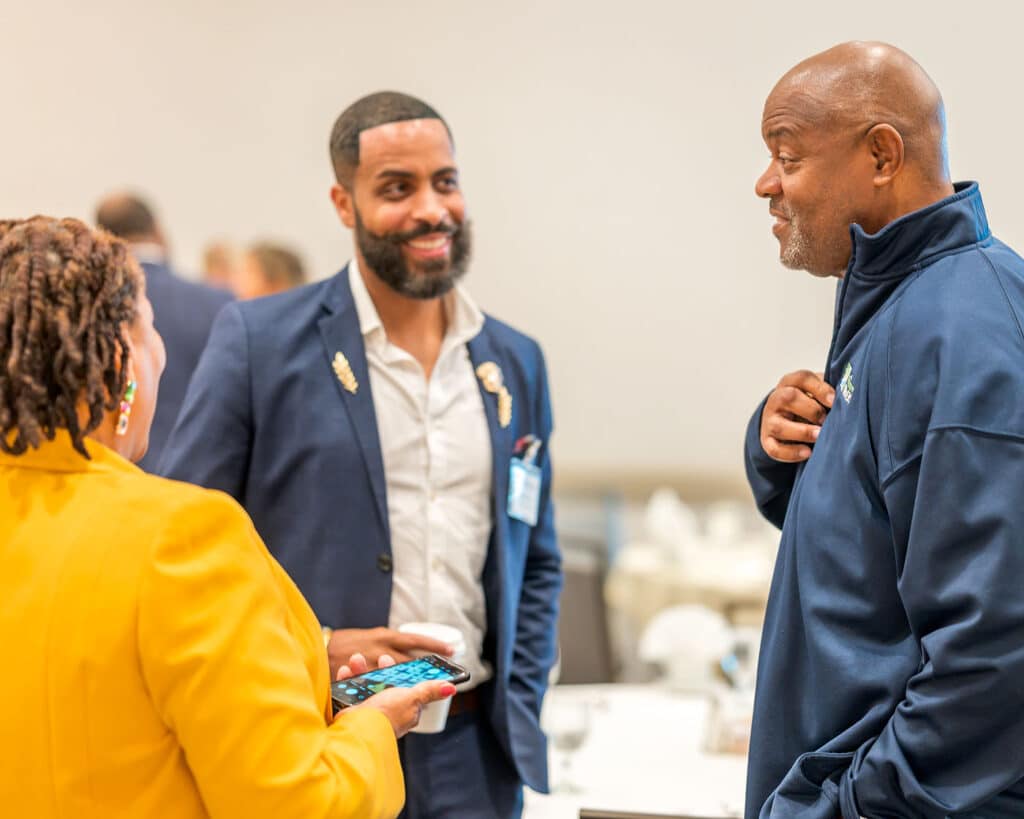
House Bill 1105
Another controversial bill, HB 1105, is framed as a public safety bill that requires local enforcement to coordinate with federal immigration officials when someone in custody is suspected of being in the country illegally.
Some say it’s an immigration bill.
“I know that the federal administration is trying to tell us there’s not a crisis. But there is a humanitarian crisis going on right now on our southern border. … But they’re not handling it the right way, and it’s starting to impact our communities,” said Hilton.
“We’ve got sheriffs who have folks in their custody, who [need] to be reported up to ICE. And essentially, they’re sort of ignoring what’s in the law right now that says you got to report these folks,” he explained.
Romman doesn’t see it that way.
“Again, when you read the contents of the bill, that is, unfortunately, not what it does,” she said. “I’m one of the few, if not the only, member of the legislature that’s done any border project work,” she remarked.
She talked about her work keeping unaccompanied immigrant minors safe.
“I want to remind people that when we talk about immigration, there’s an entire spectrum of people that we are talking about. And it’s not just at the border, it’s also people that fly into our country legally, that gets narrowed into a terrible immigration system,” Romman said.
“It forces our state and county and city police to do federal-level work without more funding. What we’re doing is we’re actually adding an increased burden, essentially onto their workload that we are not paying for. And in addition, within this bill, if they do not do this, they could lose more funding.”
She added that this will take the police away from focusing on local issues and trying to work with people who live in their communities.
“If a community member feels like if they reach out to police for help, and the police are going to deport them, they are less likely to report crimes and less likely to work with our local police department,” Romman said. “If we’re serious about immigration and its relationship to crime, immigrants are 30% less likely to commit crimes, and I don’t want to vilify an entire group of people.”
Romman said she supports a holistic, three-pronged approach that includes improving conditions on the border and pathways to citizenship.
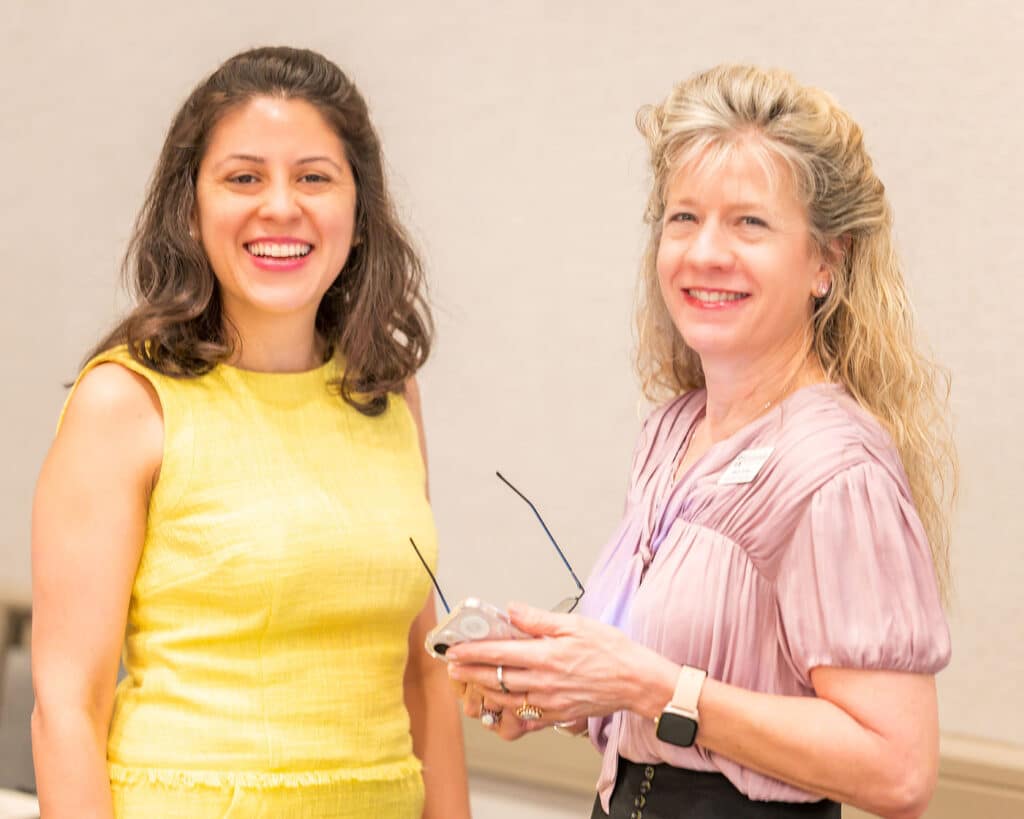
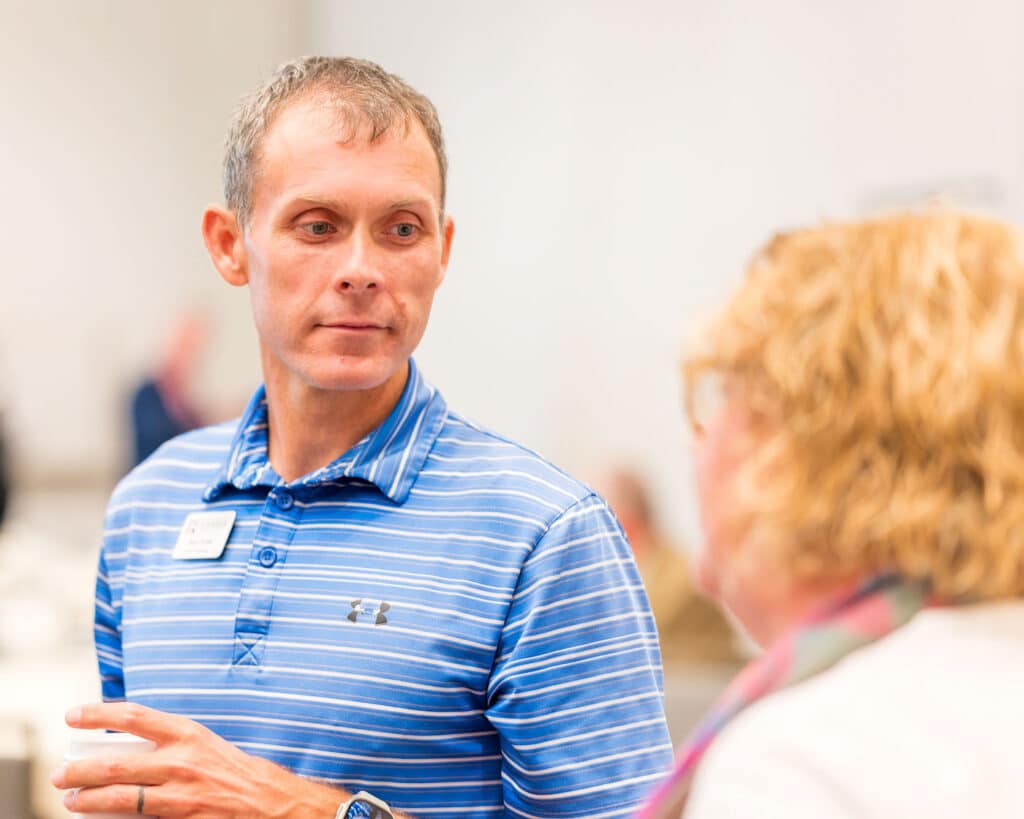

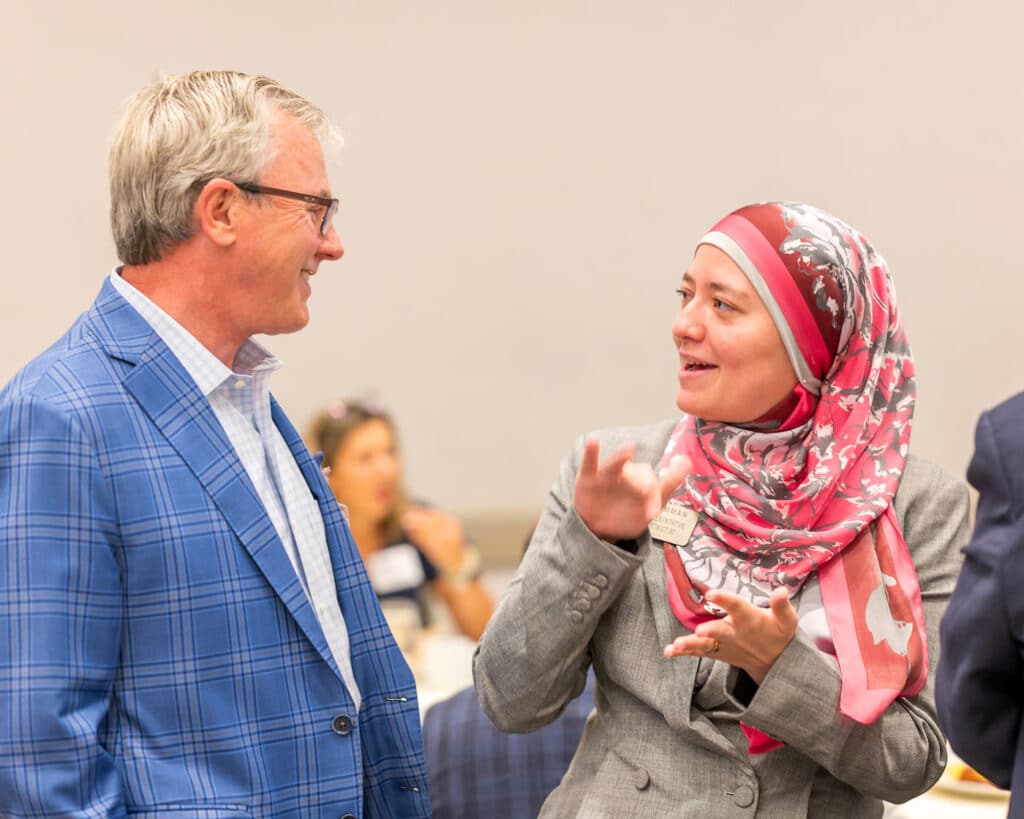
Business-related legislation
When the smoke cleared, both Hilton and Romman joked that they had different opinions about many issues but agreed that’s a healthy part of how the government works.
“The fact that we do disagree and the fact that you, the community, have varying choices and options out there. I think it’s a healthy part of the process,” said Hilton. “And we do have fun. I was telling somebody we play kickball about halfway through the session, and we do get along.”
The discussion moved on to topics such as the FTC ruling on non-compete clauses and tort reform, which just about everyone in the room agreed upon. Although employees could see the beauty of disallowing non-compete clauses, as business owners, they’d hate to see trade secrets put in jeopardy or valuable time and money put into training to benefit another company.
And everyone wanted to see caps on personal injury claims for things like slip-and-falls and fleet vehicle accidents.
“One of the few regrets I have coming out of session is that we didn’t do more on tort reform,” said Hilton. “Right now, Georgia is the number one judicial hellhole in the nation, meaning that we have more lawsuits on businesses and payouts than anywhere else in the country.”
This was one area where both representatives had similar views.
“I don’t think this is a left or right issue,” said Romman. “I want to make sure that whatever tort reform we pursue does not let, for example, a bad-acting company off the hook. But on the flip side, if somebody is just going around and suing everybody all the time to try and make some money off of it, how do you protect corporations and businesses from those kinds of bad incidents litigation?”
“What I will continue to look for when it comes to tort reform is, how are we going about balancing that?” she added.
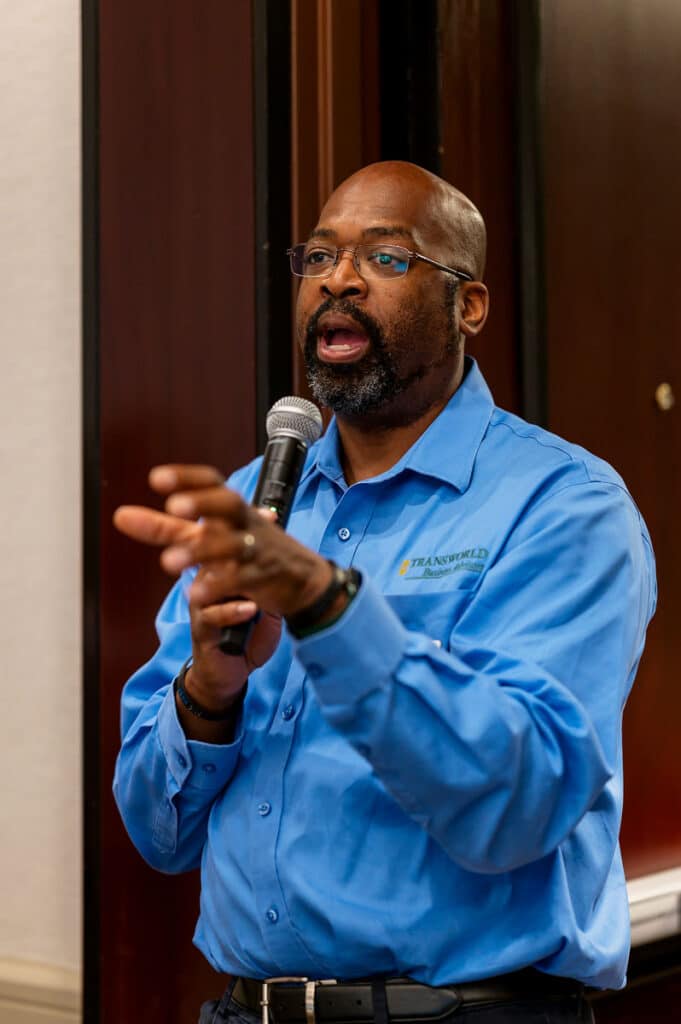
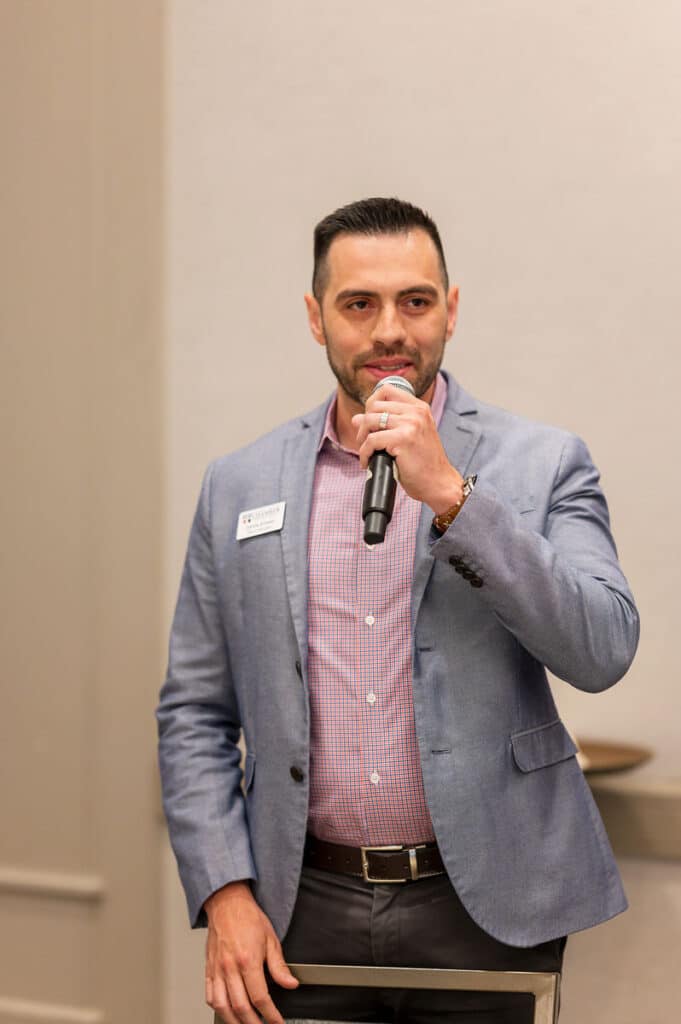

Looking ahead
As the session wrapped, Romman and Hilton pointed out legislation they’d like to see move forward next year.
“House Bill 971 creates a $300 tax credit for taxpayers who sign up for firearm safety training or purchase a safe storage device. It’s a bipartisan measure, viewed by some as a small but perhaps significant move for gun safety advocates, which was tabled in the Senate room,” said Romman.
She said the bill wouldn’t even require someone to disclose that they owned a firearm, but it was meant to incentivize people to store their firearms properly.
“There wasn’t a lot of appetite if somebody didn’t properly store their gun to have consequences for that, so we thought it would just incentivize better behavior,” she said.
Hilton mentioned school safety.
“Over the last three years, every single school in Georgia has gotten a one-time $100,000 grant for School Safety. That’s every school in Georgia; in this most recent budget, we included $45,000 in recurring money for every school in the state to do whatever they want to ensure their campuses are safe,” he said. This includes private schools as well.
At the end of the event, Hilton and Romman reminded the audience that they weren’t running against each other, and even though their views were different, their goals for a better Georgia were equally as passionate.
Related
Read the Digital Edition
Subscribe
Keep Up With Peachtree Corners News
Join our mailing list to receive the latest news and updates from our team.
You have Successfully Subscribed!

The Forum Gives Sneak Peek of New Eateries and Community Spaces

What’s going on at Jones Bridge Park and the Challenges of Urban Development

Taste of Peachtree Corners: PCBA Showcases Local Restaurants

Southwest Gwinnett Mayors Share Visions for the Future

Peachtree Corners Shines Bright with Light Up the Corners Glow Race this August

8 Events Happening In and Around Peachtree Corners This August

Peachtree Corners Shines Bright with Light Up the Corners Glow Race this August

The Forum Gives Sneak Peek of New Eateries and Community Spaces

8 Events Happening In and Around Peachtree Corners This August

Southwest Gwinnett Mayors Share Visions for the Future

Taste of Peachtree Corners: PCBA Showcases Local Restaurants

What’s going on at Jones Bridge Park and the Challenges of Urban Development

Local Resident Opens AtWork Location in Peachtree Corners

CHRIS 180 Expands its Services into Gwinnett County [Podcast]

Light up the Corners [Video]

Capitalist Sage: Business Leadership in Your Community [Podcast]

Cliff Bramble: A Culinary Adventure through Italy

Top 10 Brunch Places in Gwinnett County

A Hunger for Hospitality

THE CORNERS EPISODE 3 – BLAXICAN PART 1

Top 10 Indoor Things To Do This Winter

The ED Hour: What it takes to Remove Barriers from Education
Peachtree Corners Life
Topics and Categories
Trending
-
Business3 days ago
The Forum Gives Sneak Peek of New Eateries and Community Spaces
-
Business1 week ago
Taste of Peachtree Corners: PCBA Showcases Local Restaurants
-
City Government5 days ago
Southwest Gwinnett Mayors Share Visions for the Future
-
Community3 days ago
Peachtree Corners Shines Bright with Light Up the Corners Glow Race this August






